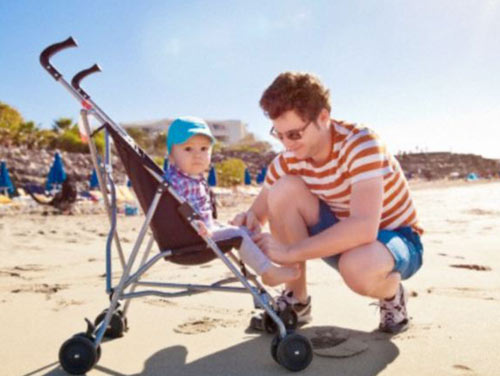當(dāng)前位置: Language Tips> 雙語(yǔ)新聞
Men without children are 'more depressed and sad' than childless women
分享到
|
 But when it came to men who already had children, the tables were turned. Nearly 60 percent of mothers wanted more children, compared to 55 percent of fathers |
|
Men without children are more likely to suffer depression about the issue than their female counterparts. British researchers found that men are almost as likely as women to want children, and they feel more isolated, depressed, angry and sad than women if they don't have them. Childless women were more likely to cite personal desire and biological urge as major influences, compared to men. Men were more likely to cite cultural, societal and family pressures than were women. Robin Hadley, of Keele University, found that 59 percent of men and 63 percent of women said they wanted children. Of the men who wanted children, half had experienced isolation because they did not have any children, compared with 27 percent of women. Thirty-eight percent of men had experienced depression because they did not have any children, compared with only 27 percent of women. One in four men had experienced anger because they did not have any children, compared with 18 percent of women, while 56 percent of men had experienced sadness because they did not have any children, compared with 43 percent of women. However, no men had experienced guilt because they did not have any children although 16 percent of women had. Mr Hadley said: 'My work shows that there was a similar level of desire for parenthood among childless men and women in the survey, and that men had higher levels of anger, depression, sadness, jealousy and isolation than women. 'This challenges the common idea that women are much more likely to want to have children than men, and that they consistently experience a range of negative emotions more deeply than men if they don't have children.' He carried out his survey of 27 men and 81 women who were not parents using an online questionnaire among people aged 20 to 66, with an average age of 41. (Source: Dailymail) |
沒(méi)有孩子的男性比沒(méi)有孩子的女性更容易為此感到抑郁。 英國(guó)研究人員發(fā)現(xiàn),男性對(duì)后代的渴望和女性幾乎一樣強(qiáng)烈,但男性如果沒(méi)有孩子會(huì)感到更加孤立、抑郁、憤怒和悲傷。 相比男性,無(wú)兒無(wú)女的女性想要孩子的主要影響力更多地來(lái)自個(gè)人欲望和生物本能。男性則更多地表示自己受到來(lái)自文化、社會(huì)和家庭的壓力。 英國(guó)基爾大學(xué)的羅賓?哈德利發(fā)現(xiàn),59%的男性和63%的女性表示自己想要小孩。 那些想要孩子的男性當(dāng)中,有半數(shù)因?yàn)闆](méi)有子女而產(chǎn)生孤立感,相比之下,只有27%的女性因此感到孤立。 38%的男性曾因?yàn)樽约簺](méi)有孩子而感到抑郁,而無(wú)子女女性抑郁的比例僅為27%。 四分之一的男性曾因自己沒(méi)有孩子而感到憤怒,而女性的這一比例為18%。56%的男性因?yàn)闊o(wú)子女而感到悲傷,而為此悲傷的女性比例為43%。 然而,沒(méi)有男性因?yàn)樽约簺](méi)有生育小孩而感覺(jué)內(nèi)疚,但為此感到內(nèi)疚的女性占了16%。 哈德利說(shuō):“我的研究工作顯示,調(diào)查中無(wú)子女的男性和女性想當(dāng)父母的渴望一樣強(qiáng)烈,但是男性的憤怒、抑郁、悲傷、嫉妒和孤立情緒比女性更多。 “人們普遍認(rèn)為,女人比男人更想要小孩,而且如果沒(méi)有孩子,女性持續(xù)體驗(yàn)到的各種負(fù)面情緒比男性程度更深。這一研究挑戰(zhàn)了這一觀點(diǎn)。” 他用網(wǎng)上問(wèn)卷的形式調(diào)查了無(wú)兒無(wú)女的27名男性和81名女性,這些人的年齡在20歲到66歲之間,平均年齡為41歲。 相關(guān)閱讀 女?dāng)?shù)學(xué)教授少源于該職業(yè)和生育相沖突 英大學(xué)評(píng)出父母心中孩子必讀十大好書(shū) (中國(guó)日?qǐng)?bào)網(wǎng)英語(yǔ)點(diǎn)津 陳丹妮) |
分享到
關(guān)注和訂閱

口語(yǔ)
關(guān)于我們 | 聯(lián)系方式 | 招聘信息
電話:8610-84883645
傳真:8610-84883500
Email: languagetips@chinadaily.com.cn